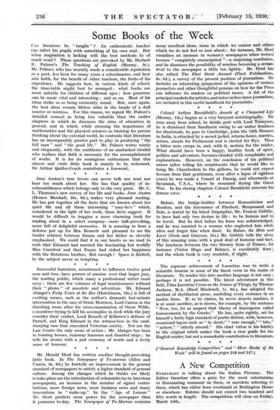Some Books- of the Week
CAN literature be, " taught " ? . An enthusiastic teacher can infect his. pupils_with something of his own zeal. .But when inspiration is lacking will the best methods- be of. much avail ? These questions are, provoked by Mr. Herbert: E. Palmer's The .Teaching of English (Murray, 3s.). Mr. Palmer, who has recently made a considerable reputation as a poet, has been for many years a schoolmaster, and here sets forth, for the- benefit of other teachers, the fruits of his experience. He suggests how, in various kinds of. school, the time-table might best be arranged ; what books are most suitable .for children of different ages ; how grammar can be made vital and interesting ; and so on. Most of his, ideas strike us as being eminently sound. But, once again, the best ideas remain lifeless rules in the hands of a dull master or mistress. For this reason, we regard Mr. Palmer's, detailed counsel as being less valuable than the earlier chapters in which he discusses the aims of education. in general, and in which, while stressing the, importance of mathematics and the physical, sciences as training for precise- thinking about the external world, he contends that literature: has an incomparably greater part to play in producing "the full man" and " the good life." Mr. Palmer writes wisely_ and eloquently, with the confidence of an unabashed idealist who realizes that faith is necessary for the accomplishment of works. It is for its contagious enthusiasm that this sincere and virile little book is mainly to be „welcomed. Sir Arthur Quiller-Couch contributes a foreword. .










































 Previous page
Previous page